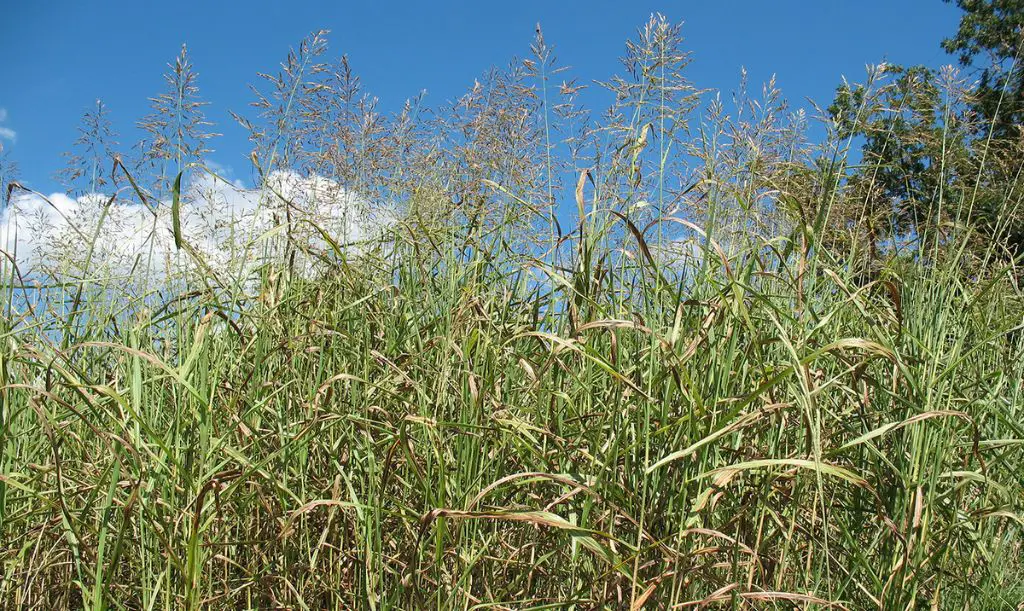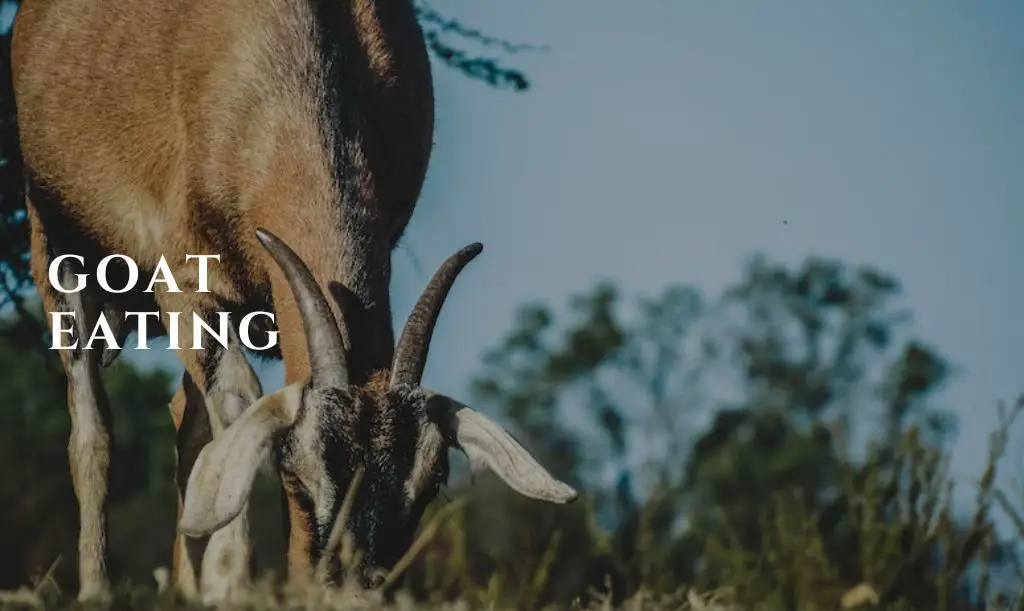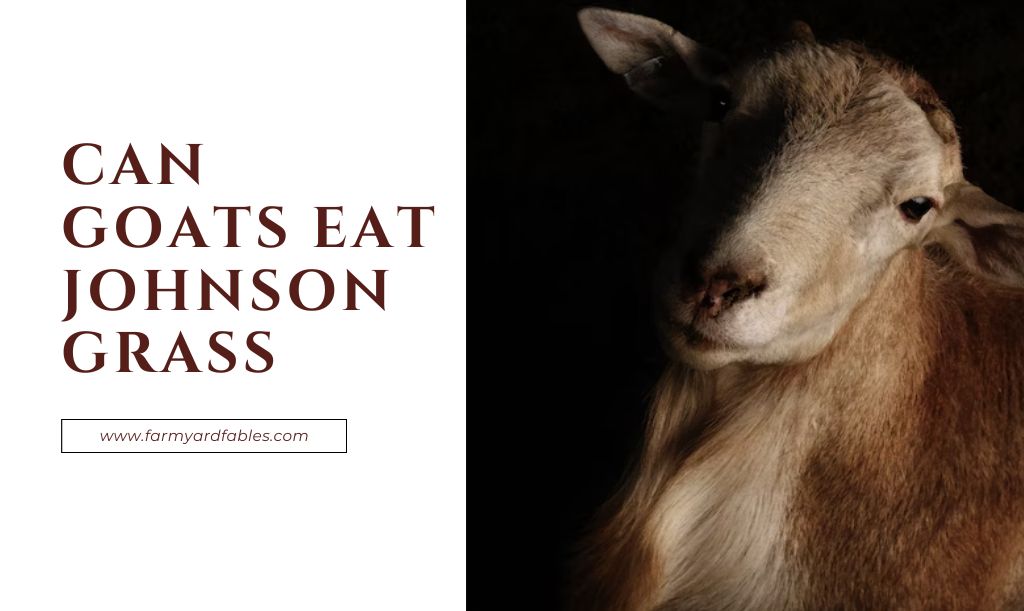My goats always fascinate me with their peculiar dietary habits. They can eat almost anything and sometimes, that worries me because I have a lot of things growing on my farm.
One of the most recent questions I’ve had is: Can goats eat Johnson grass?
Yes, goats can eat Johnson grass, but caution is advised. Johnson grass can contain toxic compounds that may be harmful to goats. It’s essential to ensure the Johnson grass is properly cured, free from mold, and not contaminated before feeding it to goats.
In this article, we will explore not just the feeding habits of these fascinating animals but also delves into the benefits and risks of eating Johnson Grass.
Let’s begin!
Can Goats Eat Johnson Grass (Key Takeaways)
- Johnson grass is generally safe for goats to eat, but caution is advised.
- Occasionally, Johnson grass can contain toxic compounds that may harm goats.
- It’s crucial to ensure the Johnson grass is properly cured, free from mold, and not contaminated with any harmful substances before feeding it to goats.
- Monitor the goats’ health and digestion when introducing Johnson grass into their diet.
- If there are concerns or uncertainties about the safety of Johnson grass, consult with a veterinarian or animal nutritionist for guidance.
- It’s important to provide a diverse forage mix for goats, including a variety of grasses and legumes, to ensure a balanced and nutritious diet.
What To Feed Goats
Here’s a comprehensive table showing what you can and cannot feed goats:
[table id=1 /]
Please note that not all plants that goats can’t eat are included in this list, and the same applies for plants they can eat. Also, the toxicity level of some plants can vary, and some are only harmful in large quantities or certain parts of the plant. Always consult with a vet or a goat expert if you are unsure about a particular plant or food.
Brief Overview of Goats’ Dietary Habits
Before we plunge into the depths of Johnson grass consumption by goats, let’s take a moment to understand their overall dietary habits.
Goats, being ruminant herbivores, possess an exceptional ability to digest plant material that would leave many other creatures flabbergasted.
In essence, goats are browsing animals that prefer a diverse array of vegetation rather than being confined to a monotonous menu.
Their inquisitive nature leads them on culinary expeditions through forests, meadows, and even your backyard garden (be warned!).
From leafy greens to woody shrubs, goats possess an extraordinary appetite for all things green and fibrous.
Watch this:
What Exactly Is Johnson Grass

I’ve discovered that when it comes to invasive plants, Johnson grass reigns supreme with its unwavering determination to take over any patch of land it sets its roots in.
This perennial plant, scientifically known as Sorghum halepense, belongs to the family Poaceae and can be identified by its robust clumps of tall, coarse grass.
Standing proudly at heights of up to seven feet, Johnson grass boasts lush green leaves that seem almost eager to soak up the sunlight.
Its stems are sturdy and fibrous, capable of withstanding harsh weather conditions and proving a challenge for even the most experienced gardeners.
Traveling Seeds: Origins and Distribution of Johnson Grass
Originally hailing from Mediterranean regions, Johnson grass embarked on an unforeseen journey that led it across continents and territories.
It is believed that European colonizers unintentionally transported its seeds during their conquests, unknowingly spreading this botanical troublemaker far from its homeland.
Nowadays, this tenacious intruder can be found wreaking havoc on agricultural fields, roadsides, pastures, and disturbed areas throughout North America.
Nutritional Composition: A Sneaky Deception
Though visually appealing in its verdant glory, one cannot help but question what lies beneath the surface when it comes to the nutritional composition of Johnson grass.
While some may assume that such a towering weed would offer little sustenance to grazing animals like goats, they would be mistaken.
Remarkably enough, this invasive plant packs a surprising nutritional punch!
A closer analysis reveals that Johnson grass contains appreciable levels of carbohydrates along with moderate amounts of protein and fiber.
Additionally, it provides essential minerals such as calcium and phosphorus while also harboring vitamins like vitamin A and vitamin E.
Goats’ Dietary Preferences
When it comes to feeding, goats are often referred to as “browsers” rather than “grazers.”
Unlike cows or sheep that prefer grazing on grass, goats have a natural instinct to explore a variety of plants and shrubs.
Their curious nature drives them to sample different types of vegetation within their reach.
With an agile and nimble nature, goats are adept at climbing, reaching for leaves, twigs, and even standing on their hind legs if necessary.
This browsing behavior allows them to access a broader range of forage options than other livestock animals.
Typical Forage Preferences for Goats
While goats have diverse palates and can consume various plants, there are some common forage preferences they exhibit.
I’ve found that goats particularly enjoy browsing on tree leaves such as blackberry, mulberry, willow, and maple.
They also relish bushes like raspberry or blueberry as well as low-lying shrubs such as honeysuckle or thistle.
Additionally, vines like grapes or wisteria can provide a delightful treat for these curious creatures.
Moreover, certain herbaceous plants like clover and dandelion greens are highly relished by goats due to their tender leaves and palatable flavors.
Factors Influencing Goats’ Food Choices
Several factors play a significant role in influencing the food choices of goats. Firstly, aroma plays a vital role as goats possess strong olfactory senses.
They are drawn towards plants with aromatic compounds that signal freshness and desirability.
Secondly, the taste of the plant affects their preference; bitter-tasting foliage is often avoided unless no other suitable options exist.
Additionally, texture matters too; goats tend to prefer leaves that are not too tough or fibrous but rather palatable with soft textures.
Goats also adapt their food choices based on the availability of forage in their surroundings, as scarcity can push them to explore plants they might not typically consume.
So, Can Goats Eat Johnson Grass?

Now that we know what goats like to eat, let’s see if Johnson grass makes the cut!
Compatibility Between Goats and Johnson Grass
Goats are known for their ability to consume a wide variety of plants, making them excellent foragers. However, when it comes to Johnson grass (Sorghum halepense), caution must be exercised.
While goats can technically eat Johnson grass, it is important to understand the compatibility between these animals and this particular plant.
Tolerance Levels In Different Goat Breeds
The tolerance levels of goats towards consuming Johnson grass can vary across different breeds.
Some breeds possess a higher level of tolerance due to their genetic makeup, while others may be more susceptible to negative effects.
For instance, certain heritage breeds like Spanish or Kiko goats have developed a natural resistance to toxic plants, including Johnson grass.
On the other hand, dairy breeds such as Nubians or Saanens might not possess the same level of tolerance and may experience adverse reactions if fed large quantities of this plant.
Potential Risks Associated With Feeding Johnson Grass To Goats
While goats can consume small amounts of Johnson grass without issues, there are potential risks involved when feeding it in large quantities.
One main concern is the presence of prussic acid (hydrogen cyanide) within this species.
Under certain conditions like drought or frost damage, the concentration of prussic acid can increase significantly in the plant’s tissues.
If goats ingest high levels of prussic acid-containing plants like Johnson grass, it can lead to poisoning symptoms such as rapid breathing, tremors, convulsions, and even death in severe cases.
Moreover, another risk associated with feeding too much Johnson grass revolves around its high fiber content.
Although fiber is crucial for maintaining healthy digestion in goats, an overabundance of fibrous material can cause bloating or digestive disturbances if not balanced properly with other dietary components.
Therefore, it is essential to consider the quantity and quality of Johnson grass being fed to goats, ensuring it is provided in moderation and alongside a well-rounded diet to mitigate potential risks.
While goats can technically eat Johnson grass, their compatibility with this plant depends on factors such as breed-specific tolerance levels and careful management of potential risks.
Nutritional Value of Johnson Grass for Goats
Next, lets analyze the nutritional content that can be found in Johnson Grass:
Analysis of the Nutritional Content in Johnson Grass
When it comes to assessing the nutritional content of Johnson grass, it is essential to understand what goats can gain from munching on this abundant plant.
Firstly, let’s talk carbohydrates.
Johnson grass is packed with carbohydrates that provide goats with ample energy to graze and engage in their playful antics.
It offers a good balance between simple sugars and complex starches, making it a suitable source of sustained energy for our caprine friends.
Moving on to proteins, Johnson grass does not disappoint!
It contains a decent amount of protein that is essential for muscle development and growth in goats.
Proteins are made up of amino acids, which are crucial building blocks for body tissues and play a vital role in various physiological functions.
Goats need proteins not only for growth but also for maintaining their general health and overall well-being.
Now, let’s talk about the fats present in Johnson grass.
While not as significant as carbohydrates or proteins, this plant still contributes some healthy fats to a goat’s diet.
Fats serve as concentrated sources of energy and aid in the absorption of fat-soluble vitamins.
They also provide insulation and protect internal organs in goats during colder months. We have fiber—the roughage that keeps our goat’s digestive system running smoothly.
Johnson grass contains an impressive amount of fiber that aids digestion by promoting rumination (the regurgitation and rechewing process).
It helps regulate bowel movements while preventing digestive issues such as bloating or constipation.
Vitamins and Minerals Present in the Plant
Apart from its macronutrient composition, Johnson grass is also rich in various vitamins and minerals necessary for maintaining optimal goat health.
Let’s explore these vital nutrients one by one:
- Vitamin A: Johnson grass is abundant in beta-carotene, a precursor to vitamin A. This vitamin is essential for good vision, healthy skin and hair, and a robust immune system in goats.
- Vitamin C: Goats can benefit from the presence of vitamin C in Johnson grass, which acts as an antioxidant and supports their immune function.
- Calcium: Johnson grass contains a fair amount of calcium, which is crucial for bone development and maintaining strong teeth in goats.
- Phosphorus: Another mineral found in Johnson grass is phosphorus, vital for energy metabolism and bone health. It works hand-in-hand with calcium to ensure proper mineral balance in goats’ bodies.
- Potassium: This mineral aids in maintaining proper fluid balance, nerve function, and muscle contractions in goats. Johnson grass provides a good source of potassium for our caprine companions.
Potential Benefits to Goat Health from Eating Johnson Grass
By including Johnson grass as part of their diet, goats can experience various health benefits.
The consumption of carbohydrates provides them with the necessary energy to thrive throughout the day while engaging in playful antics.
Proteins aid muscle development and growth while supporting overall health.
The fats present contribute essential nutrients that help maintain body temperature during harsh weather conditions.
The fiber content assists with optimal digestion by promoting rumination and preventing digestive ailments such as bloating or constipation.
Moreover, the ample presence of vitamins like A and C strengthens their immune system while ensuring proper vision, healthy skin, hair growth, and overall vitality.
The minerals calcium, phosphorus, potassium also play crucial roles in maintaining strong bones and teeth while supporting essential body functions such as fluid balance or nerve conduction.
Incorporating Johnson grass into your goat’s diet can provide them with a well-rounded nutritional profile that supports their overall well-being.
However, it is important to note that moderation is key when feeding any new food item to your goats.
Always consult with a veterinarian or animal nutritionist to ensure a balanced diet that meets the specific needs of your goats.
Feeding Guidelines when Introducing or Incorporating Johnson Grass Into Their Diet
When considering feeding goats Johnson grass, it’s important to follow some key guidelines to ensure their well-being.
Firstly, start by introducing small amounts of Johnson grass gradually.
This allows the goat’s digestive system to adapt and prevents any sudden dietary changes that may lead to digestive upset.
Begin by mixing small quantities of Johnson grass with their regular feed and monitor their response closely.
Furthermore, it is crucial to ensure that the Johnson grass you provide is of good quality.
Opt for fresh, green leaves rather than wilted or dry ones, as they tend to be more palatable and nutritious for your goats.
Also, make sure that the grass is free from any harmful contaminants or chemicals that could potentially harm your goats’ health.
Balancing the Diet
While Johnson grass can be a valuable addition to a goat’s diet due to its high nutritional value, it should not comprise their entire feed.
Goats require a balanced diet consisting of various forages and supplements.
Ensure that they have access to other hay varieties, browse plants like shrubs and trees, and a mineral supplement specifically formulated for goats.
To maintain optimal health, monitor your goats’ body condition regularly and adjust their diet accordingly.
I’ve found that my goats’ preferences vary; some consume more Johnson grass than others while others prefer other types of feed.
It’s essential to observe your goats closely and make adjustments as needed based on their appetite and overall health.
Can Goats Eat Johnson Grass (Conclusion)
While goats can indeed eat Johnson grass, proper management practices must be followed to ensure their well-being.
By gradually introducing this fodder into their diet in conjunction with other sources of nutrition such as hay and supplements tailored for goats’ needs, you can significantly enhance their diet and overall health.
By being attentive to their preferences and closely monitoring their response, you can strike a balance that keeps your goats content and thriving.
Remember, a varied diet is key to maintaining healthy and happy goats.
So, go ahead and let your goats indulge in some Johnson grass, knowing that you’ve taken the necessary steps to ensure their dietary success.
Related Article:
FAQs
Is Johnson grass hay safe?
Johnson grass hay is generally safe for goats to eat. However, it can occasionally contain toxic compounds that may harm goats. It’s crucial to ensure the hay is properly cured and free from mold or contamination before feeding it to goats.
What is the most nutritious grass for goats?
While there isn’t a single “most nutritious” grass for goats, varieties like Bermuda grass, Timothy grass, and Orchard grass are commonly considered nutritious options. These grasses provide a balance of essential nutrients, fiber, and palatability for goats.
What is the best forage for goats?
The best forage for goats depends on factors such as location, climate, and the goat’s nutritional needs. Generally, a diverse forage mix including grasses like Bermuda, Timothy, or Orchard grass, along with legumes like clover or alfalfa, can provide a well-rounded diet for goats.
Is sorghum good for goats?
Yes, Sorghum can be good for goats. However, it’s important to note that some varieties of sorghum may contain high levels of prussic acid, which can be toxic to goats. Ensuring the selection of safe, low-prussic acid sorghum varieties and proper harvesting techniques is essential to safely include sorghum in a goat’s diet. Consulting with a local agricultural extension or veterinarian is advised.
- Do Goats Sound Like Humans? Find Out Here! - 22 December 2023
- Vegetable Oil For Constipated Goat (Comprehensive Guide) - 22 December 2023
- Is Bermuda Hay Good For Goats? (Solved!) - 21 December 2023


